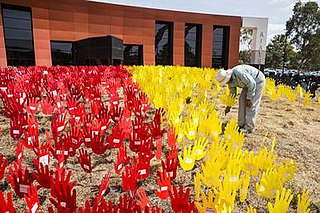The Central Australian Aboriginal Media Association (CAAMA) is an organisation founded in 1980 to expose Aboriginal music and culture to the rest of Australia. It started with 8KIN-FM, the first Aboriginal radio station in the country. Based in Alice Springs, the organisation is particularly focused on the involvement of the local Indigenous community in its production. CAAMA is involved in radio, television and recorded music.

The Adelaide Film Festival is a film festival usually held for two weeks in mid-October in cinemas in Adelaide, South Australia. Originally presented biennially in March from 2003, since 2013 AFF has been held in October. Subject to funding, the festival has staged full or briefer events in alternating years; some form of event has taken place every year since 2015. From 2022 it takes place annually. It has a strong focus on local South Australian and Australian produced content, with the Adelaide Film Festival Investment Fund (AFFIF) established to fund investment in Australian films.

The Australian Institute of Aboriginal and Torres Strait Islander Studies (AIATSIS), established as the Australian Institute of Aboriginal Studies (AIAS) in 1964, is an independent Australian Government statutory authority. It is a collecting, publishing, and research institute and is considered to be Australia's premier resource for information about the cultures and societies of Aboriginal and Torres Strait Islander peoples.

Larissa Yasmin Behrendt is an Australian legal academic, writer, filmmaker and Indigenous rights advocate. As of 2022 she is a professor of law and director of research and academic programs at the Jumbunna Institute for Indigenous Education and Research at the University of Technology Sydney, and holds the inaugural Chair in Indigenous Research at UTS.
The NAISDA Dance College is a performing arts training college based in Kariong, New South Wales for Aboriginal and Torres Strait Islander people in Australia. It was established as the Aboriginal Islander Skills Development Scheme (AISDS) in 1975, which became the National Aboriginal and Islander Skills Development Association (NAISDA) in 1988. The date of establishment of the college is usually cited as 1976, although some sources report it as 1975.
Performing arts education in Australia refers to the teaching of different styles of creative activity that are performed publicly. The performing arts in Australia encompasses many disciplines including music, dance, theatre, musical theatre, circus arts and more. Performing arts education in Australia occurs both formally and informally at all levels of education, including in schools, tertiary institutions and other specialist institutions. There is also a growing body of evidence, from the Australian Council for the Arts and the Parliament of Australia, showing that First Nation's participation in the arts and culture has significant economic, social and cultural benefits to Australia and further supports the outcomes of the Australian governments ‘Closing the Gap’ campaign. There has been an increasing number of scholarships opening up in educational institutions for Indigenous Australians aimed at encouraging this participation in the arts.

The Australian Film Commission (AFC) was an Australian government agency was founded in 1975 with a mandate to promote the creation and distribution of films in Australia as well as to preserve the country's film history. It also had a production arm responsible for production and commissioning of films for the government. It was superseded by Screen Australia from 1 July 2008.

South Australian Film Corporation (SAFC) is a South Australian Government statutory corporation established in 1972 to engage in film production and promote the film industry, located in Adelaide, South Australia. The Adelaide Studios are managed by the South Australian Film Corporation for the use of the South Australian film industry.

National Indigenous Television (NITV) is an Australian free-to-air television channel that broadcasts programming produced and presented largely by Aboriginal and Torres Strait Islander people. It includes the six-day-a-week NITV News Update, with programming including other news and current affairs programmes, sports coverage, entertainment for children and adults, films and documentaries covering a range of topics. Its primary audience is Indigenous Australians, but many non-Indigenous people tune in to learn more about the history of and issues affecting the country's First Nations peoples.

The Film Finance Corporation Australia (FFC) was the government agency responsible for funding commercial productions of Australian film, documentary, and television from 1988 to 2008. Unlike other publicly funded organisations responsible for financing media production in Australia, the FFC operated as a commercially oriented funding agency, backing projects with the intention of recouping part of its funding through investment. The organisation was responsible for financing several notable Australian feature films, among them Strictly Ballroom (1992), Muriel's Wedding (1994) and The Adventures of Priscilla, Queen of the Desert (1994). During its lifetime, the FFC supported 248 features with a total investment of A$662 million. In 2008, the FFC was succeeded by Screen Australia, which merged the similar film financing bodies operated by the Australian government.
Film and TV financing in Australia refers to government assistance to TV and cinema in Australia. Over the past 30 years, government assistance has involved a mixture of government support, distributor/ broadcaster involvement and private investment. To a significant extent, government policies have shaped the form and scale of financing.

Aaron Fa'aoso is an Australian actor, screenwriter and producer, known for his roles in East West 101, The Straits and Black Comedy. He established Lonestar Productions in 2013, which brings stories of the people of the Torres Strait Islands and north Queensland to the screen.
Fís Éireann / Screen Ireland, formerly known as Bord Scannán na hÉireann / the Irish Film Board, is the Republic of Ireland's state development agency for the Irish film, television and animation industry. It provides funds for the development, production and distribution of feature films, feature documentaries, short films, TV animation series and TV drama series.

Robert Lewis Maza, known as Bob Maza, was an Aboriginal Australian actor, playwright and activist.

Rachel Perkins is an Australian film and television director, producer, and screenwriter. She directed the films Radiance (1998), One Night the Moon (2001), Bran Nue Dae (2010), and Jasper Jones (2017). Perkins is an Arrernte and Kalkadoon woman from Central Australia, who was raised in Canberra by Aboriginal activist Charles Perkins and his wife Eileen.

The National Screen Institute – Canada is a non-profit organization headquartered in Winnipeg, Manitoba, Canada. The organization describes itself as "Serving content creators across Canada to tell unforgettable stories through industry-informed training and mentoring."
Regulations on television programming in Australia are enforced by the Australian Communications and Media Authority to promote programming which reflects Australian identity and cultural diversity. Commercial networks must adhere to content quotas of Australian programming, in the categories of Australian content quotas, children's content quotas, commercial broadcasting quotas, community broadcasting quotas, public broadcasting quotas and subscription television quotas. Regulations are based on the Broadcasting Services Act 1992.
Sally Riley is an Australian filmmaker, writer, producer and media executive, as of 2021 Head of Scripted Production at the Australian Broadcasting Corporation (ABC).
Carbon Creative is an Indigenous-owned creative agency based in Brisbane, Australia. The agency was founded in 2006 and produces creative content "to help close the gap between Indigenous and non-Indigenous people" of Australia, shift perceptions of Indigenous communities that centre around negative stereotypes and economic and social disadvantage, and increase representation of First Nations Australians within Australian society.
David Jowsey is an Australian film producer, co-founder of Bunya Productions. He is known for producing many films made by Indigenous Australian filmmakers. Bunya Productions' co-owners are Indigenous filmmaker Ivan Sen, and Jowsey's wife Greer Simpkin.











